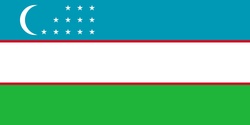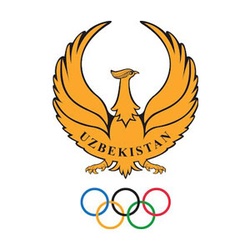Uzbekistan or the Republic of Uzbekistan meaning Home of the Uzbeks is Bordered by Kazakhstan, Turkmenistan, Tajikistan, Kyrgyzstan and Afghanistan it is positioned on the ancient Great Silk Road between Europe and Asia.
The main industries in the country are textiles, food processing, machine building, petroleum, gold, natural gas and chemicals.
Its main trading partner is Russia. It is the second largest exporter of cotton in the world and the seventh largest producer of gold.
The capital is Tashkent. The countries flag has three equal horizontal bands of blue, white, and green separated by red fimbriations with a white crescent moon and 12 white stars in the upper left side quadrant.









